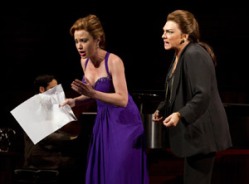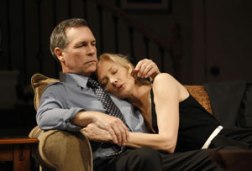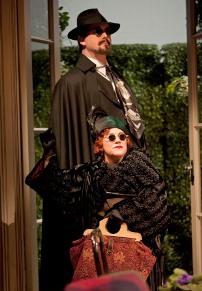Review: Rent
Aug 15th
 Anyone who saw Rent in its original incarnation at the New York Theatre Workshop will no doubt be discomfited to see that it has now become a theatrical brand. Just three years after it closed on Broadway after a twelve-- year run, it has returned in a fresh production at the New World Stages, that subterranean theatrical venue where dead or dying Main Stem shows go to be reborn.
Anyone who saw Rent in its original incarnation at the New York Theatre Workshop will no doubt be discomfited to see that it has now become a theatrical brand. Just three years after it closed on Broadway after a twelve-- year run, it has returned in a fresh production at the New World Stages, that subterranean theatrical venue where dead or dying Main Stem shows go to be reborn.
The revival, its producers have freely admitted, is born less of creative than financial reasons. Although some of its technical elements have been rejiggered and a fresh young cast has been assembled, this is essentially the same show that existed before, with original director Michael Greif once again holding the reins.
As a purely commercial venture, it’s likely to succeed. Rent was a touchstone for a certain generation when it premiered in 1996, and a new younger audience seems prepared to embrace it as well. Its milieu of a rundown, drug-ridden East Village has largely been obliterated by gentrification—even at its premiere the work had a nostalgic tinge. By now, its setting is probably as exotic to younger audiences as the 19th century Paris of its inspiration, La Boheme.
This tale of a ragtag group of artists dealing with poverty, drug addiction and AIDS, among other things, was always hampered by its rather unwieldy book and scattershot characterizations. What made it work originally--besides the emotional impact of creator Jonathan Larson’s sudden death the night before the first preview—was the truly exciting rock music score and the pitch-perfect performances by a largely unknown cast, many of whom would go on to stardom.
Larson’s score, performed here as it was before by a five-piece band, is still a powerhouse, but its impact is somewhat lessened by muddy acoustics that often render the lyrics incomprehensible. But it doesn’t seem to matter to its viewers, who lustily cheered when they heard the familiar opening notes of the show’s anthem, “Seasons of Love.”
The young ensemble, competing with the memories of such breakout stars from the original as Taye Diggs, Idina Menzel, Jesse L. Martin, Daphne Rubin-Vega and Anthony Rapp (most of whose performances were preserved in the ill-fated 2005 film version), certainly bring raw energy to the proceedings. Sadly, they mostly pale in comparison to their predecessors: the exceptions are Adam Chanler-Berat, whose eerie resemblance to Larson (accentuated by a similar haircut), brings an emotional frisson to his turn as the filmmaker Mark; and Annaleigh Ashford, whose giddy exuberance as the performance artist Maureen is an interesting contrast with Menzel’s more acerbic interpretation.
Rent fanatics will notice that the once largely open set design has been replaced by one divided into smaller configurations that more evocatively convey the cramped apartments of the East Village, and that the lighting and choreography are altered, to not much different effect.
It was probably silly to hope that a fresh approach would have been applied to a clearly successful concept. But it’s also a shame that this Rent feels like more of a museum piece than the wonderfully vital revival of Hair that is currently competing for those nostalgia dollars.
New World Stages 340 W.50th St. 212-239-6200. www.telecharge.com.
Review: Death Takes a Holiday
Jul 22nd

It’s not easy to kill Death Takes a Holiday. This old chestnut about the Grim Reaper taking a much needed vacation was a Broadway hit way back in the 1920s, spawned a successful 1934 movie adaptation starring Fredric March, and was the basis for the much maligned 1998 remake Meet Joe Black, starring Brad Pitt. Its latest incarnation is an off-Broadway musical presented by the Roundabout Theatre Company featuring a score by Maury Yeston, who’s had some experience with the subject with his Tony Award-winning score for Titanic.
The project was begun years ago as a collaboration between Yeston and author Peter Stone, who died in 2003. The book is credited to both Stone and Thomas Meehan, ofThe Producers and Annie fame.
As might be expected from its subject, the show is a tasteful, dignified, and fairly stodgy affair, albeit one with some lovely moments. The creators have wisely not updated the story, setting it in 1921 shortly after World War I, so it’s not surprising that an overworked Death (Julian Ovenden) would need a break.
He takes the human form of Nikolai Sirki, a Russian prince who shows up unexpectedly at the lakeside Italian villa owned by Duke Vittorio Lamberti (Michael Siberry). Not surprisingly, all of the women on hand immediately swoon for the handsome stranger, including the duke’s daughter Grazia (Jill Paice), engaged to the boorish Corrado Montelli (Max von Essen).
The duke, aware of the interloper’s real identity and under strict instructions not to reveal it under threat of, well, death, tries to warn everyone to keep their distance from him. But to no avail, as Grazia quickly forgets about her fiancé and promptly falls in love with Sirki, who, much to his surprise, finds himself returning her affections.
Other characters thrown into the mix include the Duke’s wife (Rebecca Luker); Grazia’s dementia-afflicted grandmother (Linda Balgord) and the elderly doctor (Simon Jones) who’s long loved her; and Grazia’s best friend (Alexandra Socha) and sister-in-law (Mari Davi). Showing up briefly is an American aviator (Matt Cavenaugh) who flew with Grazia’s late brother in the war.
Stone and Meeham’s book strains to give all of these characters their due, with the result that Death is given rather short shrift. More problematic is the general somber tone, alleviated only by the occasional sly touches of humor--“I rarely get many laughs,” admits Death at one point.
Yeston’s operetta-style score is similarly subdued. Although the music and lyrics are certainly proficient, they are rarely inspired, with only one number, “Life’s a Joy,” rising above the dense pack.
Working amidst admittedly modest circumstances—the small stage doesn’t provide much leeway in terms of scene changes and the orchestra is a modest ten pieces—director Doug Hughes doesn’t manage to provide much energy or imagination to the staging.
The show’s biggest asset is British actor Ovenden in the leading role. This 35-year-old performer is clearly a star on the rise. Displaying matinee idol handsomeness, a chiseled physique (you could practically hear the sighs when he takes off his shirt), a gorgeous tenor voice, and genuine charisma, he single-handedly lifts the show to another level. Hugh Jackman, watch your back.
Laura Pels Theatre, 111 W. 46th St. 212-719-1300. www.roundabouttheatre.org.
Review: Master Class
Jul 8th

Tyne Daly has big shoes to fill in Terrence McNally’s Master Class. Not just those of her character, the legendary opera star Maria Callas, but also such esteemed forerunners in the role as Zoe Caldwell and Patti LuPone, who delivered mesmerizing turns as the imperious star in the 1995 play’s original Broadway run.
But while Daly seemingly lacks the diva-lack qualities necessary to fully embody the part, she more than delivers the goods in this Manhattan Theatre Club revival, first seen last year at Washington, D.C.’s Kennedy Center. Her Callas is perhaps less immediately commanding and formidable than her predecessors, but with the help of subtle make-up and superb technique she pulls it off in dazzling fashion.
McNally’s conceit is to show Callas teaching a master class at Julliard, something she actually did briefly in 1971 after she had stopped performing. As she interacts with several cowering and worshipful young student singers, an endlessly patient pianist, and an uncommunicative stagehand, she delivers acerbic comments about their techniques, reveals colorful anecdotes about her life and career, and occasionally loses herself in reveries in which she recalls singing her greatest roles.
The play is essentially a tricked-up version of the sort of autobiographical one-person shows that have become a theatrical staple. But it works beautifully and, as this production again demonstrates, it serves as a terrific vehicle for actresses who are up to its considerable demands.
Whether asking with mock innocence out about her supposed rivals, “How can you have rivals when no one can do what you do?”; observing of several unlucky audience members that they have “no presence”; or criticizing one of the students for having the temerity to wear an evening gown to class, Daly’s Callas is a deliciously bitchy creation.
The actress is well supported by Sierra Boggess in the role for which Audra McDonald won a Tony Award; Alexandra Silber as a tremulous young singer who can barely get a note out; and Garrett Sorenson as a big-boned tenor whose rendition of an aria from Tosca brings Callas to tears.
Stephen Wadsworth’s staging gives the proceedings a properly realistic feel, while Thomas Lynch’s shifting sets effectively convey both the modest university theater setting and the grandiose La Scala when Callas relives her past triumphs.
You don’t have to be an opera buff, although it certainly helps, to appreciate the incisive portrait that the playwright has created of one of the twentieth century’s most iconic performers. And Daly, like Caldwell and LuPone before her, delivers a commanding performance that is a master class all by itself.
Samuel J. Friedman Theatre, 261 W. 47th St. 212-239-6200. www.Telecharge.com.
Review: Side Effects
Jun 21st

The latest in a seemingly endless series of plays about crumbling marriages, Michael Weller’s Side Effects never manages to transcend its formulaic aspects. This companion piece to the playwright’s Fifty Words-- presented a few seasons back at the same theater--is yet another portrait of two people who are clearly in love but have reached a crossroads in their relationship.
Theatergoers need not have seen the earlier work to be immersed in the world of Hugh (Cotter Smith) and Melinda (Joely Richardson), a seemingly picture-perfect couple. He is a handsome, successful businessman being groomed for big things in Midwestern politics. She’s an acclaimed writer whose lithe gorgeousness is only accentuated by her perfect sense of style.
But not surprisingly, there are cracks beneath the glossy surface. The emotionally closed Hugh, the heir to a successful manufacturing company, has seen his business begin to fail. Melinda suffers from bipolar disorder, a condition that is worsened by her refusal to hew to her pharmaceutical regime.
During the course of several encounters depicted over ninety minutes, we watch as the pair’s relationship unravels in the face of dual infidelities, political machinations, and a potential scandal involving the couple’s teenage sons.
Although the playwright’s gifts for incisive characterizations and sharply tinged dialogue, previously exhibited in such works as Loose Ends and Spoils of War, remains undiminished, his pile-on of melodramatic incidents here has a contrived, artificial feel. When Melinda makes a furtive phone call to her lover (a character from Fifty Words) merely seconds after Hugh has left the room, it smacks more of plot machination than reality, even if the character’s recklessness has been well established.
Director David Auburn, a celebrated playwright in his own right (Proof), is unable to bring much credibility to the proceedings. What makes the evening work to the extent that it does are the finely calibrated performances by the two actors. Smith, an expert at playing tightly wound, Type-A alpha males, well conveys Hugh’s underlying vulnerability, while Richardson, delivering her character’s sharp retorts with enjoyable gusto, perfectly captures both Melinda’s emotional volatility and her irresistible allure.
Also adding to the overall effect is Beowulf Boritt’s set, which starts out as a tasteful representation of a beautifully appointed suburban home that, like the relationship between the characters inhabiting it, is ultimately reduced to an empty shell.
Lucille Lortel Theatre, 121 Christopher St. 212-279-4200. www.ticketcentral.com.
Review: Drama At Inish at the Shaw Festival
Jun 17th
 A quick visit to the Shaw Festival at picturesque Niagara-on-the-Lake, Ontario yielded an unexpected delight in the form of Drama at Inish. This 1933 little-known work by Irish playwright Lennox Robinson is receiving an endearing revival courtesy of the venerable festival currently celebrating its 50th anniversary.
A quick visit to the Shaw Festival at picturesque Niagara-on-the-Lake, Ontario yielded an unexpected delight in the form of Drama at Inish. This 1933 little-known work by Irish playwright Lennox Robinson is receiving an endearing revival courtesy of the venerable festival currently celebrating its 50th anniversary.
For me, the production was a revelation in more ways than one. I chose the show with the hope of seeing an unfamiliar theatrical gem. Imagine my surprise, then, to realize that I had already seen it a couple of years ago at New York City’s excellent Mint Theatre. Except that it was then called Is Life Worth Living?, the title which was also employed for its 1933 London premiere.
But no matter: Whatever it’s called, the play is a diverting, old-fashioned comedy that well deserves its multiple rediscoveries. And this production, staged by the festival’s artistic director Jackie Maxwell, does it full justice.
Set at a modest hotel in a seaside town in Ireland, the satirical comedy depicts the chaos that ensues after the arrival of a visiting drama troupe. Accustomed to light comedies and circus entertainments, the audiences are taken aback by the heavy duty fare presented by the “De La Mare Repertory Company,” which instead features works by the likes of Strindberg, Chekhov, Tolstoy and Ibsen.
Their exposure to these ultra-serious plays causes the normally jovial townspeople to morbidly reassess their lives, resulting in emotional upheaval. A local politician experiences a crisis of conscience after seeing An Enemy of the People. The hotel’s spinster proprietress relives the loss of a past love, and both acts of violence and suicide attempts suddenly become commonplace.
What might have been heavy-handed satire is instead consistently delightful. The play’s disparate group of characters proves an entertaining lot, particularly Constance Constantia and Hector de la Mare (played with enjoyable hamminess by Corrine Koslo and Thom Marriott), the married couple who are the visiting troupe’s leaders and resident stars. Also endearing is the hotel’s eager employee “Boots” (the delightful Andrew Bunker)—the scene in which he reveals unexpected talent while auditioning for the skeptical visitors proves the evening’s highlight.
The talky play’s languorous pacing, especially in Act One, may prove irritating to impatient theatergoers. But if you allow yourself to go with its gentle flow, the ironically titled Drama at Inish offers plenty of comic rewards. And this superbly staged and acted production, housed in the cozy confines of the Shaw Festival’s Court House Theatre, fully realizes them.
Court House Theatre, Niagara-on-the-Lake, Ontario, Canada. 800-5111-SHAW. www.shawfest.com.